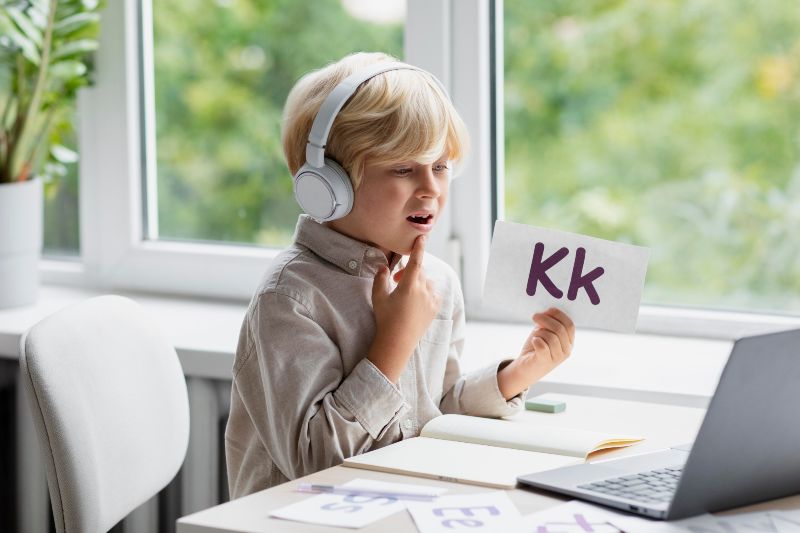Das Singen und Lernen von Kinderliedern auf Englisch kann für Kinder (und auch Erwachsene) sehr hilfreich sein. Kinderlieder auf Englisch bieten wie Kinderbücher eine spielerische und gleichzeitig interaktive Art des Englischlernens. Wenn Du mit Deinem Kind also niedrigschwellig Englisch lernen willst, dann sind Kinderlieder genau das Richtige, um zu üben.
Warum Kinderlieder so gut sind, um eine Fremdsprache zu lernen
In den folgenden Absätzen wird erklärt, warum Kinderlieder auf Englisch so gut geeignet sind, um zu Englisch zu lernen. Anschließend werden die Top 7 Kinderlieder auf Englisch aufgelistet.
Einfache Sprache
Die Sprache in Kinderliedern ist in der Regel einfach und die Texte haben Passagen, die sich häufig wiederholen. Dadurch sind die Texte leicht zu verstehen und gut zu merken. Dies hilft Kindern, zügig ein Grundverständnis für das Englische zu entwickeln. Außerdem motiviert dieser Umstand dazu, sich weiter mit Englisch zu beschäftigen.
Hörverstehen und Aussprache
Da die Kinderlieder rhythmisch und melodisch sind, helfen sie dabei, die Aussprache zu üben und zu verbessern. Außerdem wird das Gehör für die Fremdsprache geschult und somit langfristig das Verständnis des Englischen erweitert sowie verbessert.
Sprachstrukturen und Vokabular
Selbst wenn Kinderlieder auf Englisch keine Grammatikregeln erklären, werden sich einige trotzdem im Gedächtnis des Kindes verankern. Sie hören und imitieren korrektes Englisch und werden sprachliche Strukturen verinnerlichen, ohne diese zu reflektieren.
Die Texte der Kinderlieder erweitern außerdem den Wortschatz des Lernenden auf spielerische Art und Weise – also mit positiv besetzten Emotionen: keine andere Art des Lernens ist nachhaltiger. Es hilft dabei zusätzlich, wenn der Liedtext Wörter behandelt, die relevant für oder präsent sind im Alltag des Kindes.
Kulturelles Wissen
In den Texten von Kinderliedern auf Englisch steckt häufig eine geballte Ladung kulturelles Wissen über das Land, dem es entsprungen ist. Sobald Kinder Lieder auf Englisch singen und verstehen, erfahren sie auch etwas über die englische oder amerikanische Kultur und Traditionen. Sprichst Du mit Deinem Kind über eventuelle Unterschiede zur eigenen Kultur und Traditionen, förderst du auch dessen interkulturelle Kompetenz.
Einen noch größeren Effekt haben diesbezüglich Serien, die sich zum Englischlernen für Kinder eignen.
Die Top 7 Kinderlieder zum Englischlernen
Es gibt eine große Anzahl an Kinderliedern auf Englisch. Die folgenden sieben Lieder sind aus unterschiedlichen Gründen geeignet, um Englisch zu lernen.
- Head, Shoulders, Knees And Toes
Dieses Kinderlied auf Englisch eignet sich hervorragend, um Körperteile auf Englisch zu lernen. Es ist flott, es gibt eine passende Choreographie dazu, was dem Gedächtnis helfen wird, sich den Text schneller und besser zu merken und Kinder haben in der Regel große Freude an diesem Song.
Head, shoulders, knees and toes, knees and toes.
Head, shoulders, knees and toes, knees and toes.
and eyes and ears and mouth and nose.
Head, shoulders, knees and toes, knees and toes.
Head, shoulders, knees and toes, knees and toes.
Head, shoulders, knees and toes, knees and toes.
and eyes and ears and mouth and nose.
Head, shoulders, knees and toes, knees and toes.
Head, shoulders, knees and toes, knees and toes.
Head, shoulders, knees and toes, knees and toes.
and eyes and ears and mouth and nose.
Head, shoulders, knees and toes, knees and toes.
Head, shoulders, knees and toes, knees and toes.
Head, shoulders, knees and toes, knees and toes.
and eyes and ears and mouth and nose.
Head, shoulders, knees and toes, knees and toes.
- Twinkle Twinkle Little Star
Dieser Klassiker unter den Kinderliedern ist sehr gut, um die schwierigere Wörter wie when, how, gone oder upon zu lernen. Für kleinere Kinder enthält er auch einfache Begriffe wie star oder sky.
Twinkle, twinkle, little star,
how I wonder what you are.
Up above the world so high
like a diamond in the sky.
Twinkle, twinkle little star,
how I wonder what you are.
When the blazing sun is gone,
when the nothing shines upon,
then you show your little light.
Twinkle, twinkle, all the night.
Twinkle, twinkle, little star,
how I wonder what you are.
- If You’re Happy and You Know It
Dieses Kinderlied ist ein weiterer Klassiker auf Englisch. Mit dem Text lassen sich viele einfache Wörter lernen. Außerdem gibt es einen kleinen Tanz, der zum Lied passt und den Kindern in der Regel sehr gefällt. Sie werden dadurch zusätzlich zum Verstehen und Lernen des englischen Kinderliedes angeregt.
If you’re happy and you know it, clap your hands (klatsch, klatsch).
If you’re happy and you know it, clap your hands (klatsch, klatsch).
If you’re happy and you know it, then your face will surely show it.
If you’re happy and you know it, clap your hands. (klatsch, klatsch).
If you’re happy and you know it, stomp your feet (stampf, stampf).
If you’re happy and you know it, stomp your feet (stampf, stampf).
If you’re happy and you know it, then your face will surely show it
If you’re happy and you know it, stomp your feet. (stampf, stampf).
If you’re happy and you know it, shout „Hurray!“ (Hoo-ray!).
If you’re happy and you know it, shout „Hurray!“ (Hoo-ray!).
If you’re happy and you know it, then your face will surely show it
If you’re happy and you know it, shout „Hurray!“ (Hoo-ray!).
If you’re happy and you know it, do all three (klatsch-klatsch, stampf-stampf, hoo-ray!).
If you’re happy and you know it, do all three (klatsch-klatsch, stampf-stampf, hoo-ray!).
If you’re happy and you know it, then your face will surely show it.
If you’re happy and you know it, do all three. (klatsch-klatsch, stampf-stampf, hoo-ray!).
- Five Little Monkeys Jumping on the Bed
Das Lied erzählt von fünf kleinen Affen und bringt den Kindern bei, die englischen Zahlen von 1 bis 5 sowie einfache Wörter wie bed, doctor, head und monkeys. Das Lied Five Little Ducks eignet sich im Übrigen ebenso, um die Zahlen 1 bis 5 zu lernen.
Five little monkeys jumping on the bed.
One fell off and bumped his head.
Mama called the doctor,
and the doctor said:
No more monkeys jumping on the bed.
Four little monkeys jumping on the bed.
One fell off and bumped his head.
Mama called the doctor,
and the doctor said:
No more monkeys jumping on the bed.
Three little monkeys jumping on the bed.
One fell off and bumped his head.
Mama called the doctor,
and the doctor said:
No more monkeys jumping on the bed.
Two little monkeys jumping on the bed.
One fell off and bumped his head.
Mama called the doctor,
and the doctor said:
No more monkeys jumping on the bed.
One little monkeys jumping on the bed.
One fell off and bumped his head.
Mama called the doctor,
and the doctor said:
Put those monkeys right to bed!
- The Wheels on the Bus
Es ist eines der beliebtesten englischen Kinderlieder. Der Song lehrt den Kleinen Vokabeln, die mit dem täglichen Leben und mit dem Transportmittel Bus zu tun haben, also: wheels (dt. Räder), people (dt. Menschen), horn (dt. Hupe) usm. Tipp: Es gibt auch eine deutsche Version des Liedes, die als Vergleich oder zum vermischen ebenso gelernt werden kann. Das kann auch helfen, den Liedtext auf Englisch schneller und besser zu verstehen.

The wheels on the bus go round and round,
round and round,
round and round.
The wheels on the bus go round and round,
all through the town!
The people on the bus go up and down,
up and down,
up and down.
The people on the bus go up and down,
all through the town!
The horn on the bus goes beep, beep, beep,
beep, beep beep,
beep, beep, beep.
The horn on the bus goes beep, beep, beep,
all through the town!
The wipers on the bus go swish, swish, swish,
swish, swish, swish,
swish, swish, swish.
The wipers on the bus go swish, swish, swish,
all through the town!
The signals on the bus go blink, blink, blink,
blink, blink, blink,
blink, blink, blink.
The signals on the bus go blink, blink, blink,
all through the town!
The motor on the bus goes zoom, zoom, zoom,
zoom, zoom, zoom,
zoom, zoom, zoom.
The motor on the bus goes zoom, zoom, zoom,
all through the town!
The babies on the bus go waa, waa, waa,
waa, waa, waa,
waa, waa, waa.
The babies on the bus go waa, waa, waa,
all through the town!
The parents on the bus go shh, shh, shh,
shh, shh, shh,
shh, shh, shh.
The parents on the bus go shh, shh, shh,
all through the town!
The mummy on the bus says, I love you,
I love you, I love you.
The daddy on the bus says, I love you, too.
All through the town.
- Itsy Bitsy Spider
Dieses englische Lied ist ein sehr kurzes Kinderlied auf Englisch und dementsprechend schon für die jüngsten Kinder geeignet, da es nur wenig Wortschatz enthält und außerdem lautmalerisch ist, was die Aussprache erleichtert.
The itsy bitsy spider
went up the water spout.
Down came the rain and
washed the spider out.
Out came the sun
and dried up all the rain.
Now the itsy bitsy spider
went up the spout again.
- Hickory Dickory Dock
Dieses Kinderlied ist ein Reim und für Anfänger geeignet. Durch den schnellen Rhythmus und die große Anzahl an Vokabeln, ist es gut für diejenigen, die ihr Englisch – oder das ihres Kindes – verbessern wollen. Es ist relativ lang. Dementsprechend werden sehr viele Wörter verinnerlicht, wenn es auswendig gelernt wird.
Hickory Dickory dock,
the mouse ran up the clock.
The clock struck one,
the mouse ran down.
Hickory Dickory dock.
Hickory Dickory dock,
the mouse ran up the clock.
The clock struck two,
and down he flew.
Hickory Dickory dock.
Hickory Dickory dock,
The mouse ran up the clock.
The clock struck three,
and he did flee.
Hickory Dickory dock.
Hickory Dickory dock,
The mouse ran up the clock.
The clock struck four,
he hit the floor.
Hickory Dickory dock.
Hickory Dickory dock,
The mouse ran up the clock.
The clock struck five,
the mouse took a dive.
Hickory Dickory dock.
Hickory Dickory dock,
The mouse ran up the clock.
The clock struck six,
that mouse, he split.
Hickory Dickory dock.
Hickory Dickory dock,
The mouse ran up the clock.
The clock struck seven,
8, 9, 10, 11.
Hickory Dickory dock.
Hickory Dickory dock,
The mouse ran up the clock.
As twelve bells rang,
the mousie sprang.
Hickory Dickory dock.
Hickory Dickory dock,
„Why scamper?“ asked the clock.
„You scare me so
I have to go!“
Hickory Dickory dock.

Finden Sie Ihre perfekte Lehrkraft
Bei italki finden Sie Ihre Englisch-Nachhilfelehrkraft unter qualifizierten und erfahrenen Lehrkräften. Erleben Sie jetzt eine exzellente Sprachlernreise!
Buchen Sie eine Probestunde
Fazit
Kinderlieder auf Englisch eignen sich aus einer Vielzahl an Gründen für das Englischlernen. Allerdings können sie nicht mehr als eine Grundlage für das Fremdsprachenlernen bilden. Wenn Du Dein Kind noch besser fördern willst, dann schau bei italki vorbei. Dort findest du Englischlehrerinnen und Lehrer, die zu den Bedürfnissen deines Kindes und gleichzeitig zu deinem Budget passen.
Möchten Sie auf italki eine Sprache lernen?
Hier sind die besten Ressourcen für Sie!











